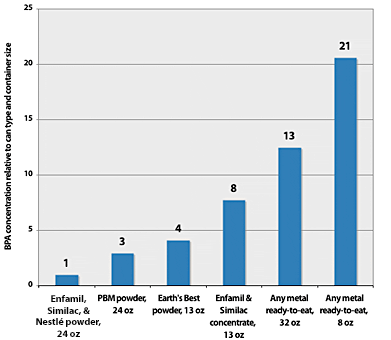Obviously, breastfed babies are happiest and healthiest; however, sometimes families have to use infant formulas to nourish their young ones. A new report issued by the Environmental Working Group (EWG) makes recommendations for feeding babies safely and avoiding Bisphenol-A (BPA). BPA is a hormone disruptor that can harm brain development and may affect behavior. Many families have switched to BPA-free bottles and sippy cups; however, infant formula containers pose a higher risk to children than baby bottles when it comes to BPA leaching.
Back in October, I wrote about the risk of BPA leaching into food and infant formula stored in tin/steel cans. Steel cans are lined with plastic containing BPA to prevent contamination from the can to the food/formula. EWG found that,
1 out of every 16 infants fed ready-to-eat liquid formula are exposed to BPA at doses exceeding those that caused increased aggression and significant changes in testosterone levels in laboratory animals.
Every manufacturer of infant formula, whether in powdered or liquid form, uses BPA to line their formula containers. These manufacturers include Nestlé, Ross-Abbot (Similac), MeadJohnson (Enfamil), Hain-Celestial (Earth’s Best), and PBM (sold under various names at Walmart, Kroger, Target and other stores). EWG tested all brands of liquid formula and found BPA had leached into the liquid formula. Powdered formulas have faired better in the tests, although not every brand has been tested yet. Thus, EWG recommends that powdered formula is the best alternative to breastmilk:
..liquid formulas have 8 to 20 times higher potential BPA leaching than the most common powdered formulas due to smaller can sizes and the fact that the product is less diluted with water. Even if the same amount of BPA leached from coated metals in powdered and liquid formulas, babies fed powdered formula will receive less BPA than those fed liquid formula from metal cans.
The Center for the Evaluation of Risks to Human Reproduction (CERHR) advises parents to avoid infant exposure to BPA until further studies have determined the harmful effects of this chemical. If you must feed your baby formula from a bottle, please consult EWG’s Guide to Baby-Safe Bottles & Formula. For further information on BPA and infant formula, please visit the following blogs and websites:
- Mothering.com
- League of Maternal Justice
- Z Recommends
Image source: Environmental Working Group

[…] increase; that was when drinking cold liquids. But how many babies are fed warm breastmilk or formula from a polycarbonate bottle? Yeesh! Study author Karin B. Michels said, We found that drinking […]